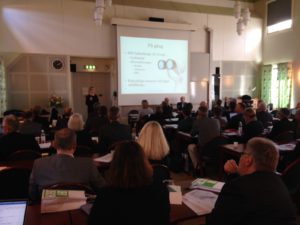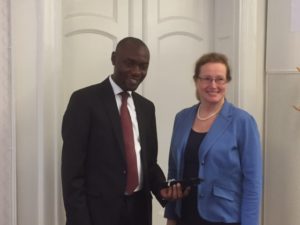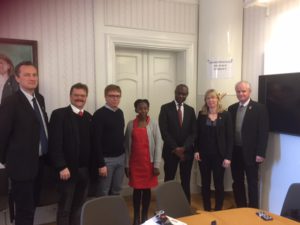(Original Swedish post published 22 March.)
Once a semester, the vice-chancellors and heads of administration of Swedish higher education institutions (HEIs) gather for a meeting of the General Assembly of the Association of Swedish Higher Education. The agenda this time was packed with topics for discussion, information and decisions and kept us busy all day in Kristianstad. As usual, the Assembly began with a seminar, this time under the heading Trust-based governance and reform of resource allocation. This is a topical subject in view of the inquiry on governance and resource allocation that has been announced. Björn Brorström, Vice-Chancellor of the University of Borås, presented a preliminary report. The key issues were how to develop and establish an effective and efficient higher education landscape, HEI autonomy, and increased confidence and trust-based governance of public organisations. Compared with other countries, Sweden stands out for its high proportion of external funding, performance-based funding for education rather than basic funding, and separate appropriations for education and research. A single, combined appropriation is highlighted as an important tool and a desirable change. I am not convinced this is the right way to go, and definitely not before thorough analysis.
Swedish HEIs have similarities and differences. The sector includes many vocational education and training programmes that are not necessarily defined as higher education in other countries, e.g. nursing, teaching, engineering. Applied research is also more common at HEIs in Sweden. I think it’s a good thing that the sector embraces all these dimensions. We often point out that dividing up pure and applied research is inappropriate, and this is one of our arguments in favour of a single faculty for engineering and technology and natural sciences. The Royal Swedish Academy of Engineering Sciences had a seminar on Monday at which the report “Four higher education institutions – four roles?” (document in Swedish) was presented. I took part in the panel commenting on the report. To some extent, the discussion today touched on the same theme. On both occasions, the issue of development contracts and/or enhanced dialogue with the Ministry came up. Both development contracts and a combined appropriation are two-edged swords and further analysis is needed of the intended effects and the means of achieving them before it is possible to conclude that this is the right way forward to achieve a long-term perspective, increased decision-making authority, a desirable differentiation between roles and respect for the responsibility of HEIs for the quality of their education, research and external collaboration.
The day was filled up with information about Ladok, SUNET, career paths and scholarships, Sweden’s national qualifications framework, the universities’ reference group on infrastructure, open science, open access and ongoing negotiations with Elsevier. Decisions were taken on recommendations and a code of conduct for agents dealing with international students. The much-appreciated administrative leadership programme will continue and we received the final report of the higher education teaching group, which has investigated the position of HEIs on higher education teaching courses – are they required to qualify for a teaching position or not? The answers are not very impressive. Charlotta Tjärdal from the Swedish National Union of Students talked about their ongoing work – resources for education are a focus issue.
On Tuesday I had time to briefly join the Ambassador of Uganda who was visiting us. The Forum for Africa Studies and the International Science Programme presented their impressive activities.
After the busy Association of Swedish Higher Education day in Kristianstad, I took the train to Kastrup, from where I flew to Ghent. Ghent University is celebrating its bicentennary and I am participating in a vice-chancellors’ conference to mark the occasion. “Shaping our coming future: Universities in a global society” is the name of the conference, and I will be participating in a panel on Friday: “Strategic academic partnerships in times of increased competition”. Ghent University is an important partner for Uppsala University and a fellow member of U4 and the Guild of European Research-Intensive Universities. / Eva



